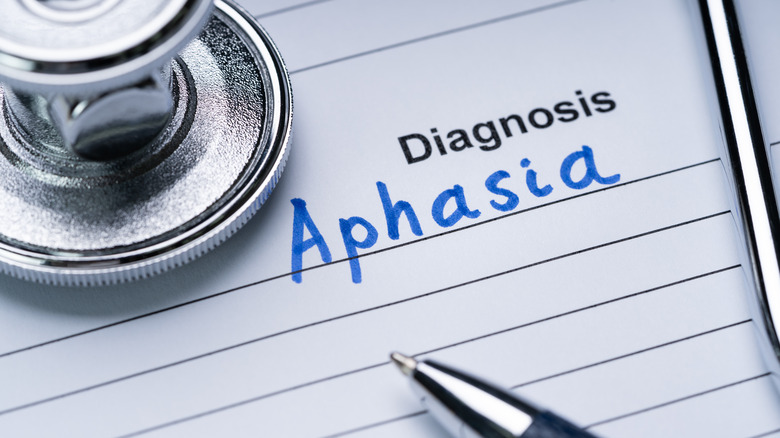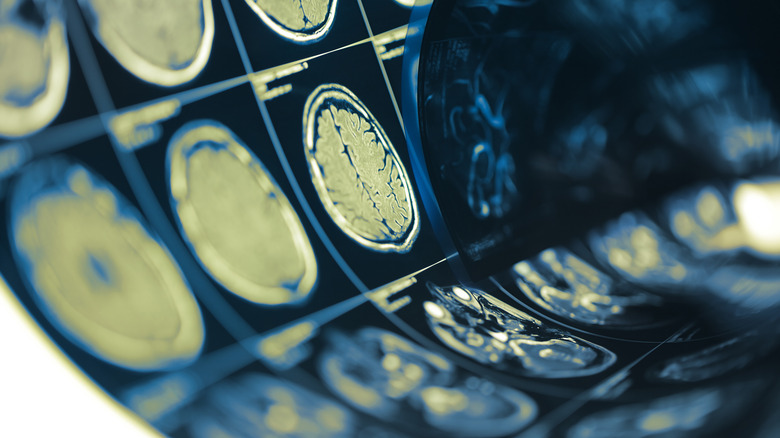Here's What Causes Aphasia - A Neurological Condition
Action movie icon Bruce Willis called time on his decades-long acting career after going public with his aphasia diagnosis. The "Die Hard" star's daughter, Rumer Willis, announced his retirement on her Instagram page on March 30, saying the neurological condition has impacted her father's cognitive abilities before thanking fans for their "continued love, compassion, and support" during what is a "challenging time" for the Willis family. According to the National Aphasia Association (NAA), Willis is one of over 2 million Americans currently suffering from the condition. Nearly 180,000 people are diagnosed with aphasia each year in the U.S., meaning the condition occurs more commonly than Parkinson's Disease, cerebral palsy, and muscular dystrophy.
Aphasia purely affects communication and does not affect a person's cognitive ability, though the brain injuries that lead to aphasia can also cause other conditions with their own sets of symptoms. Although the condition affects 2 million Americans and millions more around the globe, the NAA claims most people have never heard of it.
There are three kinds of aphasia
Johns Hopkins Medicine describes three kinds of aphasia: Broca aphasia, Wernicke aphasia, and global aphasia. All three types have different symptoms, but all will affect a sufferer's communication ability. Broca or "expressive" aphasia usually occurs after the front part of the brain is damaged and includes physical symptoms. such as weakness or paralysis in the right side of the body. In terms of communication, Broca aphasia sufferers tend to speak in shorter sentences, eliminating words like "and" and "the" from their vocabulary.
Neurologist and stroke specialist Dr. Aninda B. Acharya says Wernicke aphasia occurs most often after a stroke in the posterior temporal lobe of the brain's dominant hemisphere. According to Dr. Acharya, Wernicke aphasia impairs its sufferers' language comprehension, though "speech may have a normal rate, rhythm, and grammar." Johns Hopkins says sufferers may speak in unnecessarily long sentences, adding unnecessary or invented words.
According to the NAA, global aphasia is the most severe form of the disorder. Sufferers can produce few intelligible words and lose the ability to read or write. As with other forms of aphasia, sufferers retain their cognitive skills unrelated to language or speech. Seek emergency medical treatment if you or someone you know suddenly has difficulty speaking, trouble understanding speech, loses the ability to recall words, or develops problems with reading and writing.
Aphasia occurs after the brain is damaged
Aphasia develops after an area of the brain responsible for vocal, and written communication is damaged. The damage that causes aphasia can result from a stroke, brain tumor, or head injury. According to the NAA, a stroke is the most common cause, with 25% to 40% of stroke survivors developing some form of aphasia. The Mayo Clinic says the disease usually occurs suddenly after a head injury. Symptoms can develop slowly if the underlying cause is a degenerative brain disease or a tumor. The condition is most common amongst older people but can affect anyone regardless of their background.
The type of aphasia a person develops depends on the area of the brain that has been injured. Broca and Wernicke aphasia both get their name from the location of the brain that is affected, and the symptoms reflect what the damaged area of the brain controls. According to the University of California, both areas play a part in speech and language. Broca's area, which is in the left hemisphere, manages speech production and articulation. Wernicke's area, which is located in the posterior superior temporal lobe, covers comprehension and language processing.
Aphasia treatments are available
Potential treatments for aphasia are dependent on many factors, including the age and health of the patient, the underlying cause of the aphasia, and even the patient's right or left-handedness. The Mayo Clinic claims treatment is most effective after an early diagnosis and quick start; speech and language therapy is central to the recovery process. While few people regain their pre-diagnosis communication abilities, Mayo Clinic says that most people "make significant progress" following treatment. Treatments include group therapy, skills related to maintaining conversations, and nonverbal communication sessions.
Families are often involved in the treatment process. Johns Hopkins includes advice for people who live with an aphasia sufferer, including not correcting the person's speech, giving the person time to express themselves, and simplifying the language used. Although several treatments are available, the NAA states that a full recovery is unlikely if symptoms persist for longer than two or three months following a stroke. They do note that treatment can be a slow process and "that some people continue to improve for years and even decades."



